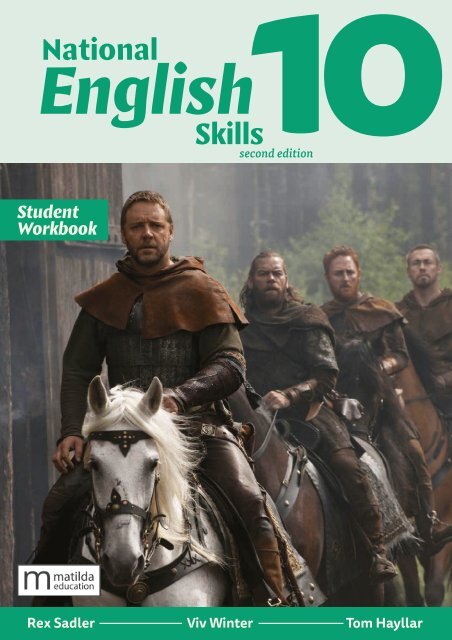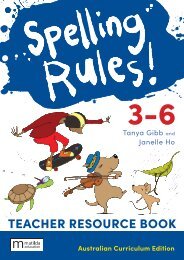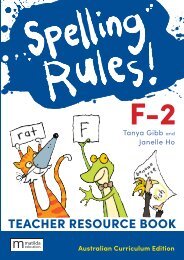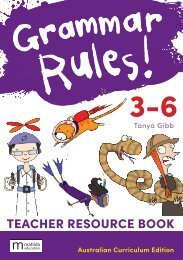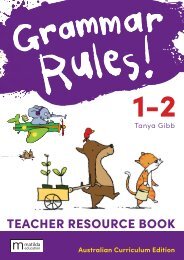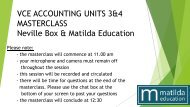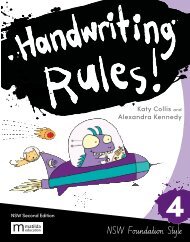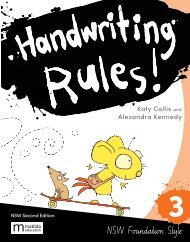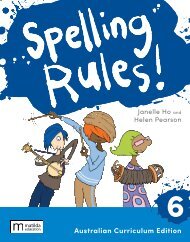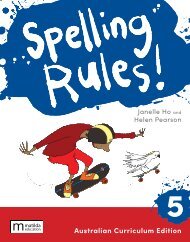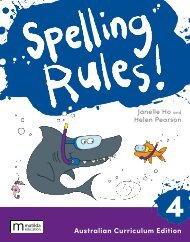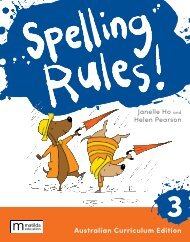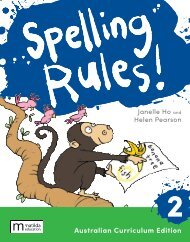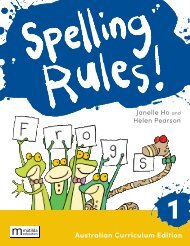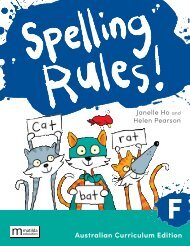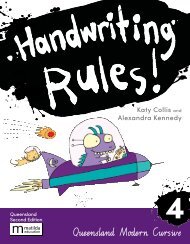National English Skills 10 2e Student Book sample/look inside
Create successful ePaper yourself
Turn your PDF publications into a flip-book with our unique Google optimized e-Paper software.
<strong>National</strong><br />
<strong>English</strong><br />
<strong>Skills</strong><br />
second edition<br />
<strong>Student</strong><br />
Workbook<br />
Rex Sadler<br />
Viv Winter<br />
Tom Hayllar
<strong>National</strong><br />
<strong>English</strong><br />
<strong>Skills</strong><br />
second edition<br />
<strong>Student</strong><br />
Workbook<br />
Rex Sadler<br />
Viv Winter<br />
i<br />
Tom Hayllar
<strong>National</strong> <strong>English</strong> <strong>Skills</strong> <strong>10</strong><br />
second edition<br />
Rex Sadler<br />
Viv Winter<br />
Tom Hayllar<br />
This edition was published in 2023 by<br />
Matilda Education Australia,<br />
an imprint of Meanwhile Education Pty Ltd<br />
Melbourne, Australia<br />
T: 1300 277 235<br />
E: customersupport@matildaed.com.au<br />
www.matildaeducation.com.au<br />
First edition published in 2012 by Macmillan Science and<br />
Education Australia Pty Ltd<br />
Second edition published in 2023 by Matilda<br />
Education Australia<br />
Copyright © Rex Sadler, Viv Winter, Tom Hayllar 2012, 2023<br />
The moral rights of the authors have been asserted.<br />
Publisher: Melinda Schumann<br />
Illustrators: Tracie Grimwood, Chris Dent<br />
Permissions researcher: Samantha Russell-Tulip<br />
Cover and text designer, typesetter: Beau Lowenstern<br />
Typeset in Tisa Pro and Tisa Sans Pro<br />
Cover image: Robin Hood, Universal Pictures (20<strong>10</strong>),<br />
Courtesy of Universal Studios Licensing LLC, Photograph:<br />
Alamy Stock Photo/UNIVERSAL PICTURES/Album<br />
All rights reserved. Except under the conditions described<br />
in the Copyright Act 1968 of Australia (the Act) and<br />
subsequent amendments, no part of this publication may<br />
be reproduced, in any form or by any means, without the<br />
prior written permission of the copyright owner.<br />
Educational institutions copying any part of this book for<br />
educational purposes under the Act must be covered by a<br />
Copyright Agency Limited (CAL) licence for educational<br />
institutions and must have given a remuneration notice<br />
to CAL.<br />
These limitations include: restricting the copying to a<br />
maximum of one chapter or <strong>10</strong>% of this book, whichever<br />
is greater. For details of the CAL licence for educational<br />
institutions, please contact:<br />
Copyright Agency Limited<br />
Level 11, 66 Goulburn Street<br />
Sydney, NSW 2000<br />
Toll-free phone number (landlines only): 1800066844<br />
Telephone: (02) 9394 7600<br />
Fax (02) 9394 7601.<br />
Email: memberservices@copyright.comau<br />
Website: https://www.copyright.com.au<br />
Publication data<br />
Author: Rex Sadler, Viv Winter, Tom Hayllar<br />
Title: <strong>National</strong> <strong>English</strong> <strong>Skills</strong> <strong>10</strong> <strong>2e</strong> <strong>Student</strong> Workbook<br />
ISBN: 978-0-6550-9215-5<br />
Warning: It is recommended that Aboriginal and<br />
Torres Strait Islander peoples exercise caution when<br />
viewing this publication as it may contain images of<br />
deceased persons.<br />
Printed in Malaysia by Vivar Printing<br />
Oct-2022
Contents<br />
Prefacevii<br />
Acknowledgmentsvii<br />
1<br />
2<br />
3<br />
4<br />
5<br />
Related texts 1<br />
Focusing on text connections 1<br />
Fairytale1<br />
‘Rapunzel’<br />
Tangled film review<br />
Greek legend 5<br />
The Iliad<br />
Troy film poster<br />
Real-life legend <strong>10</strong><br />
‘The Jerilderie Letter’<br />
Sidney Nolan painting<br />
Novel14<br />
Looking for Alibrandi novel<br />
Looking for Alibrandi screenplay<br />
The amazing <strong>English</strong> language 20<br />
<strong>English</strong> as a world language 20<br />
The origins of <strong>English</strong> 21<br />
Words from many lands 24<br />
Latin and Greek words in <strong>English</strong> 27<br />
Cultural experiences 33<br />
Focusing on culture 33<br />
An African experience 33<br />
Cola’s Journey<br />
An Irish Experience 36<br />
Angela’s Ashes<br />
A Chinese experience 38<br />
Red Scarf Girl<br />
Language Sentences40<br />
Values in literature 43<br />
What are values? 43<br />
Identifying values 43<br />
Wartime values 44<br />
‘Dulce et decorum est’<br />
The American Dream 46<br />
The Great Gatsby<br />
The love of beauty 49<br />
‘Composed upon Westminster Bridge’ 49<br />
Graphic texts 51<br />
Focusing on visual choices 51<br />
Features of a graphic novel 51<br />
Contents<br />
iii
Graphic novel 52<br />
The Kite Runner<br />
Film poster 55<br />
The Hunger Games<br />
Cartoon57<br />
‘Endangered species’<br />
6<br />
7<br />
8<br />
9<br />
Improving your word skills 61<br />
Words and meanings 61<br />
Synonyms and antonyms 63<br />
Working with words 65<br />
Persuasive texts 68<br />
Focusing on persuasion 68<br />
Being persuasive 68<br />
Poster advertisement 69<br />
‘Perfect conditions’<br />
Political speech 72<br />
‘The Unknown Soldier’<br />
Propaganda75<br />
War propaganda posters<br />
Humour80<br />
Focusing on humour 80<br />
Humorous stories 80<br />
‘The three lions’<br />
Comic strips 81<br />
‘Beyond the Black Stump’<br />
Cartoons83<br />
‘It’s her own fault …’<br />
Satire84<br />
‘Terror comes cheap at the supermarket’<br />
Caricature87<br />
‘Brainum maximum’<br />
Parody88<br />
‘The village blacksmith’<br />
‘The village burglar’<br />
Black humour 89<br />
‘I just love fast food’<br />
Journeys92<br />
What is a journey? 92<br />
Types of journeys 92<br />
Journey across the Pacific 93<br />
The Kon-Tiki Expedition<br />
Journey to Dracula’s castle 95<br />
Dracula<br />
On the high-road 97<br />
The Wind in the Willows<br />
iv<br />
Contents
<strong>10</strong><br />
11<br />
12<br />
13<br />
Different voices <strong>10</strong>0<br />
Focusing on voice in literature <strong>10</strong>0<br />
Teenage voice <strong>10</strong>0<br />
Joel and Cat Set the Story Straight<br />
Poets speaking out <strong>10</strong>3<br />
‘Time is running out’<br />
‘Throwing a tree’<br />
Refugee voice <strong>10</strong>6<br />
‘The boat people’s prayer for land’<br />
Language Point of view <strong>10</strong>8<br />
Language techniques 111<br />
Satire111<br />
Irony113<br />
Rhetorical questions 114<br />
Allusion116<br />
Repetition117<br />
Tone119<br />
Bias120<br />
Oxymoron121<br />
Paradox121<br />
The craft of the novel 122<br />
Focusing on the novel 122<br />
Elements of a novel 122<br />
Plot122<br />
Of Mice and Men<br />
Setting124<br />
Robinson Crusoe<br />
Bleak House<br />
Characters127<br />
One Flew over the Cuckoo’s Nest<br />
The Spy Who Came in from the Cold<br />
Suspense130<br />
Jurassic Park<br />
Conflict132<br />
Of Mice and Men<br />
Theme134<br />
To Kill a Mockingbird<br />
The poet’s world 137<br />
Focusing on poetry 137<br />
Appreciating a poem 137<br />
Australia139<br />
‘Warru’<br />
USA141<br />
‘A Bird came down the Walk’<br />
China143<br />
‘Lament of Hsi-Chun’<br />
Contents<br />
v
Japan144<br />
Various haiku<br />
Russia145<br />
‘First ice’<br />
England146<br />
‘Hawk roosting’<br />
Ireland148<br />
‘An Irish airman foresees his death’<br />
Jamaica149<br />
‘Jamaican fisherman’<br />
14<br />
15<br />
16<br />
17<br />
Exploring short stories 150<br />
Focusing on the short story 150<br />
Evaluating a short story 150<br />
Human conflict 151<br />
‘The sniper’<br />
Shakespeare155<br />
Focusing on Shakespeare 155<br />
William Shakespeare 155<br />
Shakespearean plot 157<br />
Shakespearean soliloquy 159<br />
Shakespearean speech 161<br />
Shakespearean description 164<br />
Shakespearean views of life 166<br />
Shakespearean quotations 168<br />
Shakespearean sonnet 169<br />
Using and misusing language 171<br />
Clichés171<br />
Jargon172<br />
Slang173<br />
Hyperbole174<br />
Euphemism175<br />
Circumlocution and verbosity 176<br />
Ambiguity177<br />
Tautology178<br />
Texts in context 179<br />
Focusing on context 179<br />
Cultural context—North Korea 179<br />
Nothing to Envy<br />
Historical context—women 182<br />
My Brilliant Career<br />
Social context—family 185<br />
Maybe Tomorrow<br />
Language Conjunctions and relative pronouns188<br />
Back-of-the-book dictionary 191<br />
vi<br />
Contents
Preface<br />
<strong>National</strong> <strong>English</strong> <strong>Skills</strong> <strong>10</strong>, second edition, has been fully revised to reflect the content descriptions of<br />
the Australian Curriculum: <strong>English</strong>, Version 9.0. It offers a practical, skills-based approach to the<br />
Language, Literature and Literacy strands, with a strong focus on developing the reading, viewing,<br />
writing, speaking and listening skills that are at the heart of the curriculum.<br />
The workbook seeks, through a diversity of high-interest texts, to engage the interest of students<br />
and to enrich their <strong>English</strong> experience. In addition to literary and non-literary texts, it draws on<br />
a variety of multimodal resources from newspapers, films, advertising, the internet and more.<br />
Texts have been carefully chosen to represent a wide range of cultural perspectives, including<br />
First Nations.<br />
The sections within each unit are self-contained, allowing them to be incorporated easily<br />
into existing teaching programs. Comprehension and language exercises are suitable for both<br />
classroom and homework tasks. Opportunities are provided throughout the workbook for<br />
students to create their own written, spoken and multimodal texts.<br />
<strong>National</strong> <strong>English</strong> <strong>Skills</strong> <strong>10</strong>, second edition, includes two completely new units:<br />
●<br />
●<br />
Unit 4: Values in literature<br />
Unit 9: Journeys.<br />
Acknowledgments<br />
The author and publisher are grateful to the following for permission to reproduce copyright material:<br />
PHOTOGRAPHS<br />
Alamy Stock Photo/©DREAMWORKS SKG/RGR Collection, 18,<br />
/©WORKING TITLE/Maximum Film, <strong>10</strong>, /20th Century Fox, 158,<br />
/A. Astes, 50, /A7A collection/Photo 12, <strong>10</strong>8, /AA Film Archive, 182,<br />
/Alan Carter, 6, /Anyka, 159, /Archive Image, 115, /Barbara Ash, 95,<br />
/Bill Bachman, <strong>10</strong>3, /Chronicle, 156, /Doron Magali/PhotoStock-<br />
Israel, 145, /frans lemmens , 48, /Ian Beattie/AUSCAPE, 139, /ICP,<br />
77, 78, /INTERFOTO/History, 2, /Josie Elias/Stockimo, 168, /MBI/<br />
Stockbroker, 19, /MGM/All Star Picture Library, 162, /Moviestore<br />
Collection, 123, 131, 135, 166, /Norbert Eisele-Hein, 20, /PA, 73, /<br />
Paul Vidler, 136, /Pictorial Press, 46, /Picture Partners, 187, /Rafal<br />
Gerszak/Aurora Photos, 53, /Recorded picture Company/Pictorial<br />
Press, 93, /RGR Collection, 36, 97, /Richard Laschon, 143, /Robert<br />
Harding World Imagery, 155, /Scott Sim, 113, /Skorzewiak, 75, /<br />
TCD/Prod.DB, 55, /UDAZKENA, 34, /UNITED ARTISTS/AA Film<br />
Archive/Allstar Picture Library Ltd, 127, /Walt Disney Pictures/<br />
Photo 12, 3, /WARNER BROS/PictureLux, 8; Alex Ellinghausen/<br />
The Age, 58; Australian War Memorial, ARTV00332, 76; Getty<br />
Images/Brooke/Topical Press Agency, 152, 153, /Eric LAFFORGUE/<br />
Gamma-Rapho, 180, /Fine Art Images/Heritage Images, 165,<br />
/George W Johnson, 126, /Terry Fincher/The Fincher Files/<br />
Popperfoto, <strong>10</strong>6, /Universal History Archive, 44; iStockphoto/<br />
Albert_Karimov, 25, /alkir, 79, /andy2673, 22, /BakiBG, 67, /<br />
bennymarty, 172, /brozova, 63, /dem<strong>10</strong>, 178, /digital_eye, <strong>10</strong>4, /<br />
eurobanks, 169, /GlobalP, 65, /igs942, 148, /irontrybex, 56, /laura<br />
brambilla, 149, /LdF, 146, /max-kegfire, 29, /Nataba, 144 (right), /<br />
olaser, 71, /Patryk_Kosmider, 171, /photosbyash, <strong>10</strong>9, /pixdeluxe,<br />
99, /S_Tanongsak, 81, /Sitade, 84, /t_rust, 28, /Tim UR, 62, /<br />
tracielouise, 141, /Trifonov_Evgeniy, 66, /UmbertoPantalone, 31,<br />
/Дмитрий Куличев, 112; The Metropolitan Museum of Art, New<br />
York, Vase, John Bennett (1840–1907), Friends of the American<br />
Wing Fund, 1984, 120; Unsplash/Alfonso Escu, 118, /Bart Ros, 74, /<br />
Chandler Cruttenden, /44 (left);<br />
Preface<br />
vii
OTHER MATERIAL<br />
Extract from ‘Terror comes cheap at the supermarket’ by Phillip<br />
Adams, The Age, 23 August 1974, The use of this work has been<br />
licensed by Copyright Agency except as permitted by the Copyright<br />
Act, you must not re-use this work without the permission of the<br />
copyright owner or Copyright Agency, 85; Extract and cover from<br />
Maybe Tomorrow by Meme McDonald and Boori Monty Pryor, Allen<br />
& Unwin, NSW, 20<strong>10</strong>, www.allenandunwin.com.au, 185–6; Extract<br />
from The Kite Runner by Khaled Hosseini, Bloomsbury, Great<br />
Britain 2004 © Khaled Hosseini. Reproduced with permission<br />
from Bloomsbury Publishing Plc, 54; Extract from the play ‘This<br />
School is Driving Me Nuts!, pages 36–37 in This School is Driving Me<br />
Nuts and Other Funny Plays For Kids, by Duncan Ball, illustrated by<br />
Craig Smith. Published by Second Look, an imprint of Christmas<br />
Press, 2016. ISBN 978099423403, 90; Macbeth: The Graphic Novel,<br />
Original Text version, published by Classical Comics Ltd, 2008 ©<br />
Classical Comics Ltd. www.classicalcomics.com, 160; Poem, Warru<br />
by Jack Davis. By Arrangement with the Licensor, The Estate of<br />
Jack Davis, c/- Curtis Brown (Aust) Pty Ltd, 139; Extract from The<br />
Spy Who Came in From the Cold by John le Carré. Reproduced with<br />
the permission of Curtis Brown Group Ltd, London on behalf of<br />
John le Carré Copyright © John le Carré 1963, 129; Extract from<br />
Looking for Alibrandi, the screenplay © Belle Ragazze Pty Ltd, 2000.<br />
Adapted from the novel Looking for Alibrandi by Melina Marchetta.<br />
Reproduced by permission from Currency Press Pty Ltd, Sydney<br />
Australia. www.currency.com.au, 16; Extract and Artwork from<br />
Horrible Humans - A Field Guide by Max Dann and Peter Viska,<br />
Little Mammoth Australia, Port Melbourne, 1990. Reproduced<br />
with permission of Max Dann and Peter Viska, 87; Poem, ‘Hawk<br />
Roosting’, from Collected Poems by Ted Hughes, published by Faber<br />
and Faber 2005, 146; Extract and Cover from Nothing to Envy: Love,<br />
Life and Death in North Korea by Barbara Demick, HarperCollins,<br />
Sydney, 20<strong>10</strong>. Reprinted with permission from HarperCollins<br />
Publishers Australia Pty, 179–80; Extract and cover from Red Scarf<br />
Girl by Ji-Li Jiang, HarperCollins Publishers, New York, NY, copyright<br />
© 1997 by Ji Li Jiang. Foreward copyright © 1997 by HarperCollins<br />
Publishers. Used by permission of HarperCollins Publishers,<br />
38–9; Extracts from Angela’s Ashes: A Memoir by Frank McCourt.<br />
Reprinted by permission of HarperCollins Publishers Ltd © Frank<br />
McCourt 1996, 36–7; Extract from The Kon-Tiki Expedition by Thor<br />
Heyerdahl. Reprinted by permission of HarperCollins Publishers<br />
Ltd © Thor Heyerdahl 1950, 93; Film review ‘Tangled’ by Leigh<br />
Paatsch, Herald Sun, 06 January 2011. The use of this work has been<br />
licensed by Copyright Agency except as permitted by the Copyright<br />
Act, you must not re-use this work without the permission of the<br />
copyright owner or Copyright Agency, 3; Poem ‘Time is Running<br />
Out’ by Oodgeroo Noonuccal, Republished with permission of<br />
Jacaranda Press, from My People, Oodgeroo Noonuccal, 1990;<br />
permission conveyed through Copyright Clearance Center, Inc.,<br />
<strong>10</strong>3; Prime Minister Paul Keating, Eulogy for the Unknown<br />
Australian Soldier, 11 November 1993, reproduced with permission<br />
of Hon P J Keating, 72; Graphic novel extract, Copyright © 2011 by<br />
Khaled and Roya Hosseini Family Charitable Remainder Unitrust.<br />
Concept Artwork Copyright © 2011 by Edizioni Piemme S.p.A,<br />
Italy. Illustrations: Fabio Celoni (ink) e Mirka Andolfo (colour),<br />
Lettering: Paola Cannatella. Script: Tommaso Valsecchi (based<br />
on the novel by Khaled Hosseini), Art Direction: Roberta Bianchi,<br />
Project supervision: Linda Kleinefeld, 52; Comic strip, Reproduced<br />
courtesy of Kookaburra Productions Pty Ltd, 82; Cartoon, Mark<br />
Lynch, 83; Poem, ‘First Ice’, by Andrey Voznesensky, from The<br />
New Russian Poets 1953 – 68 edited by George Reavey, published<br />
by Marion Boyars Publishers Ltd, London, 1981, 145; Extract and<br />
cover image from Cola’s Journey by Cola Bilkuei and Malcolm<br />
Knox reprinted by permission of Pan Macmillan Australia Pty Ltd.<br />
Copyright © Cola Bilkuei and Malcolm Knox, 2008, 33–4; Extract<br />
from The Iliad by Homer, translated by E. V. Rieu published by<br />
Penguin Classics. Translation Copyright © E. V. Rieu, 1950. Revised<br />
translation copyright © The Estate of the late E. V. Rieu and Peter<br />
Jones, 2003. Reprinted by permission of Penguin <strong>Book</strong>s Limited,<br />
5–6; Front Cover of Robinson Crusoe by Daniel Defoe published<br />
by Puffin Classics. Used by permission of Penguin <strong>Book</strong>s Limited,<br />
124; Extract from One Flew Over the Cuckoo’s Nest by Ken Kesey<br />
published by Penguin Modern Classics. Copyright © Ken Kesey,<br />
1962, renewed 1990. Copyright © The Estate of Ken Kesey, 2002.<br />
Reprinted by permission of Penguin <strong>Book</strong>s Limited, 127; Text<br />
and Artwork From Of Mice and Men by John Steinbeck published<br />
by Penguin Classics. Copyright © John Steinbeck, 1937, renewed<br />
1965. Reprinted by permission of Penguin <strong>Book</strong>s Limited, 132–3;<br />
Extract and cover from Looking For Alibrandi by Melina Marchetta.<br />
Text copyright © Melina Marchetta 1992. First published by Puffin<br />
<strong>Book</strong>s, 1992. Reprinted by permission of Penguin Random House<br />
Australia Pty Ltd, 14; Extract and cover from Joel and Cat Set the<br />
Story Straight by Nick Earls and Rebecca Sparrow Text copyright<br />
© Nick Earls and Rebecca Sparrow 2007. First published by<br />
Penguin, 2007. Reprinted by permission of Penguin Random<br />
House Australia Pty Ltd, <strong>10</strong>0–<strong>10</strong>1; ‘The Sniper’ from Spring Sowing<br />
by Liam O’Flaherty reprinted by permission of Peters Fraser &<br />
Dunlop (www.petersfraserdunlop.com) on behalf of the Estate<br />
of Liam O’Flaherty, 152–3; “Crab Haiku,” from Cherry Blossoms:<br />
Japanese Haiku Series III, trans. Bash, Buson, Issa, Shika, and others.<br />
© 1960 The Peter Pauper Press. Used with permission, 144; Extract<br />
from To Kill A Mockingbird by Harper Lee. Copyright © Harper Lee<br />
1960. First published in Great Britain by William Heinemann 1960,<br />
Arrow <strong>Book</strong>s 1989 20<strong>10</strong>. Reproduced by Permission of The Random<br />
House Group Limited, 134; Extract and Front Cover from Jurassic<br />
Park by Michael Crichton published by Arrow <strong>Book</strong>s. Copyright ©<br />
Michael Crichton 1991. Reproduced by Permission of The Random<br />
House Group Limited, 130; Film still from Looking for Alibrandi,<br />
starring Anthony La Paglia as Michael Andretti and Pia Miranda as<br />
Josie Alibrandi. Stills photographer Paolo Bassi, with permission<br />
from Robyn Kershaw Productions, 16; Text ‘The Story of <strong>English</strong>’ by<br />
Rex Sadler, 21–2; Text, travel advertisement by Sandra Sadler, <strong>10</strong>9;<br />
Poem, ‘Jamaican Fisherman’ by Sir Phillip Sherlock reproduced<br />
with permission from Hilary Sherlock, 149; Painting, Death of<br />
Sergeant Kennedy at Stringybark Creek, 1946 © The Sidney Nolan<br />
Trust. All rights reserved. DACS/Copyright Agency, 2022 Photo:<br />
© <strong>National</strong> Gallery of Australia, Canberra/© The Trustees of the<br />
Sidney Nolan Trust. All rights reserved 2022/Bridgeman Images,<br />
12; Advertisement, ‘The dark side of tanning’ © State of New South<br />
Wales (Cancer Institute NSW). For current information go to www.<br />
cancerinstitute.org.au. Licensed under CC BY 4.0 licence,<br />
https://creativecommons.org/licenses/by/4.0/, 69; Cartoon and<br />
quote, Cathy Wilcox, Sydney Morning Herald, 57, 58; Cartoon by<br />
Mike Williams, www.mikewilliamscartoons.co.uk, 89; Cover of<br />
Bleak House by Charles Dickens, Wordsworth Editions Ltd, 125.<br />
The author and publisher would like to acknowledge the following:<br />
Short story, ‘The Three Lions’ by Anonymous, 80–1; Poem, ‘The<br />
Village Burgler’ by Anonymous, 88; Poem, ‘The Boat People’s<br />
Prayer for Land’ by an anonymous Vietnamese at a refugee camp in<br />
1978, <strong>10</strong>6; Extract from One Hundred and Seventy Chinese Poems<br />
translated by Arthur Waley, Constable and Co., London, 1918,<br />
143; Poem, ‘Sparrows’ by James W. Hackett, from The Zen Haiku<br />
and Other Zen Poems of J. W. Hackett, Japan Publications, Inc, 1983.<br />
Reproduced with permission from Japan Publications on behalf of<br />
James W. Hackett, 144; Extract from The Golden Fleece by Joseph<br />
Seldin, The Macmillan Company, New York, 1963, 1<strong>10</strong>.<br />
Every effort has been made to identify copyright holders and obtain their permission for the use of copyright material.<br />
We actively solicit copyright holders or anyone with knowledge of copyright holders to come forward.<br />
viii<br />
Acknowledgments
Related texts<br />
1<br />
Focusing on text connections<br />
Texts can be related or connected to each other in many ways. Often a story or legend is<br />
retold in different contexts over time. Novels are often transformed into screenplays or<br />
play scripts. Artists often draw on existing texts and depict a scene visually, sometimes<br />
in a surprising way. Comparing related texts can lead to a deeper understanding of how<br />
writers, filmmakers, artists and other creators of texts can interpret another text and<br />
shape a meaning of their own.<br />
Fairytale<br />
The most famous version of the fairytale ‘Rapunzel’ was written by the Brothers Grimm in 1812,<br />
but there are earlier similar tales going back centuries. Such tales will continue to be told and<br />
retold many times in the future. Here is a version of the traditional fairytale.<br />
Rapunzel – the fairytale<br />
A wicked sorceress named Gothel caught her<br />
neighbour stealing rapunzel leaves from her<br />
garden to satisfy the cravings of his pregnant wife.<br />
Gothel allowed him to take the leaves as long as<br />
he gave their baby to her as soon as it was born.<br />
Gothel named the baby Rapunzel and when she<br />
was twelve years old the sorceress took her to the<br />
middle of the forest and shut her in a high tower.<br />
Over the years, Rapunzel’s magnificent golden<br />
hair grew longer and longer. Whenever the<br />
sorceress wanted to visit her, she called<br />
from below:<br />
Rapunzel, Rapunzel.<br />
Let down your hair.<br />
The sorceress then climbed up to Rapunzel’s<br />
room using her hair as a ladder.<br />
One day a prince rode past and was so charmed<br />
by an exquisite song he heard coming from the<br />
tower that he kept returning to hear it again.<br />
On one of these visits, he heard the sorceress call<br />
to Rapunzel and saw how she climbed up to her.<br />
He decided to try this himself, so the next evening<br />
he went to the tower and called:<br />
Rapunzel, Rapunzel.<br />
Let down your hair.<br />
When the prince reached Rapunzel’s room,<br />
she was frightened at first, but he was so friendly<br />
and kind that when he asked her to marry him<br />
she agreed because he would love her more than<br />
Gothel did. The prince visited her often and<br />
brought the silk for her to weave a ladder for<br />
their escape.<br />
1: Related texts<br />
1
Unfortunately, the sorceress discovered that she had not succeeded<br />
in separating Rapunzel from the world. In her rage, she grasped<br />
Rapunzel’s beautiful hair and cut it all off with a pair of scissors. She<br />
then took Rapunzel into the wilderness and cruelly left her there to<br />
live in grief and despair.<br />
The sorceress returned to the tower and used Rapunzel’s hair to<br />
trick the prince into climbing up. She told him that he would never<br />
see Rapunzel again. Beside himself with misery, he leapt from the<br />
tower into thorns that blinded him. He roamed in the forest for several<br />
years. After much suffering, he finally reached the wilderness where<br />
he heard a familiar voice singing. Rapunzel saw her prince and ran to<br />
him, weeping with joy. As she hugged him, two of her tears touched<br />
his eyes and he could see once more. He led her to his kingdom where<br />
they lived happily ever after.<br />
Illustration of Rapunzel, late 17th century.<br />
Fairytale summary<br />
Fill in this summary of the traditional fairytale ‘Rapunzel’.<br />
1 Why is the sorceress Gothel allowed to take the baby Rapunzel?<br />
________________________________________________________________________<br />
2 How does the prince react to Rapunzel’s singing?<br />
________________________________________________________________________<br />
3 Why does Rapunzel agree to marry the prince?<br />
________________________________________________________________________<br />
4 What happens when the prince discovers that Gothel has punished Rapunzel?<br />
________________________________________________________________________<br />
5 How does the blinded prince find Rapunzel?<br />
________________________________________________________________________<br />
________________________________________________________________________<br />
6 How is the prince’s blindness cured?<br />
________________________________________________________________________<br />
7 What are the main themes of this fairytale?<br />
________________________________________________________________________<br />
________________________________________________________________________<br />
2 <strong>National</strong> <strong>English</strong> <strong>Skills</strong> <strong>10</strong>
The animated musical comedy Tangled is a modern film that is loosely based on the fairytale<br />
‘Rapunzel’. The filmmakers have imaginatively embellished the story by adding extra characters,<br />
loads of humour and exhilarating adventures. Read this review of the film.<br />
Tangled<br />
(PG)<br />
LEIGH PAATSCH<br />
MOVIE OF THE WEEK<br />
DIRECTORS: BYRON HOWARD,<br />
NATHAN GRENO<br />
STARRING: THE VOICES OF<br />
MANDY MOORE, ZACHARY<br />
LEVI, DONNA MURPHY, RON<br />
PERLMAN, JEFFREY TAMBOR,<br />
PAUL F TOMPKINS,<br />
BRAD GARRETT<br />
RATING:<br />
A WITTY retelling of<br />
Rapunzel, Tangled offers<br />
a reminder of Disney’s<br />
strengths when it comes to<br />
traditional animation.<br />
Aside from the winsome<br />
Rapunzel (beautifully voiced<br />
by Mandy Moore) and her<br />
incredibly long, impossibly<br />
shiny blonde hair, most key<br />
elements of the Grimm Brothers’<br />
bedtime story have been<br />
imaginatively rearranged.<br />
This Rapunzel is a princess,<br />
abducted as a baby by a vain<br />
old hag named Gothel (Donna<br />
Murphy) because of the secret<br />
powers held by her flowing locks.<br />
Whenever Rapunzel sings,<br />
her hair gives off a magical glow<br />
that takes decades off Gothel’s<br />
gruesome <strong>look</strong>s.<br />
Hidden away <strong>inside</strong> a highrise<br />
tower deep in the forest,<br />
Rapunzel has been brainwashed<br />
by Gothel not to dare venture<br />
into the outside world.<br />
© 20<strong>10</strong> Disney<br />
However, on the eve of her<br />
18th birthday, our sheltered<br />
heroine is paid a surprise visit<br />
by a debonair woodlands rogue<br />
named Flynn Ryder (voiced by<br />
Zachary Levi).<br />
Although his smarmy selfconfidence<br />
hardly endears him<br />
to Rapunzel at first, Flynn’s<br />
worldly ways become the key<br />
that will free Rapunzel from her<br />
lifelong lockdown.<br />
So begins a rollicking tale of<br />
adventure that deftly decorates<br />
the familiar structure of a<br />
Disney animated feature – of<br />
which Tangled is the 50th in the<br />
studio’s distinguished history –<br />
with some playfully infectious,<br />
up-for-anything flourishes.<br />
The supporting characters<br />
are wonderful (particularly a<br />
white horse tracking Flynn like a<br />
bloodhound wherever he goes),<br />
as are the skilfully assembled<br />
set-pieces (the standout of<br />
which is a cascade of candle-lit<br />
Tangled is a rollicking tale of adventure.<br />
lanterns floating in the night sky,<br />
triggering the inevitable romance<br />
between Rapunzel and her beau).<br />
Even the obligatory musical<br />
interludes (co-written by Beauty<br />
And The Beast’s Alan Menken)<br />
hit just the right notes without<br />
intruding upon the fun at hand.<br />
Best seen in 3D, Tangled’s<br />
visuals keep striving for picturebook<br />
perfection throughout the<br />
film, and rarely fail to dazzle as<br />
a result.<br />
However, the filmmakers<br />
never forget that it is Rapunzel’s<br />
naive yearning for freedom that<br />
must be kept to the fore, and<br />
it is this timeless aspect of the<br />
story that will surely captivate<br />
and uplift audiences of all ages<br />
this summer.<br />
Herald Sun, 1 June 2011<br />
1: Related texts<br />
3
Comparing the fairytale and the film<br />
1 What elements of the original fairytale remain?<br />
________________________________________________________________________________<br />
2 What examples does the reviewer give to show that the circumstances relating to Rapunzel<br />
and Gothel have been ‘imaginatively rearranged’?<br />
________________________________________________________________________________<br />
________________________________________________________________________________<br />
________________________________________________________________________________<br />
3 What does Rapunzel think about Flynn’s ‘smarmy self-confidence’ and how does he<br />
compensate for this?<br />
________________________________________________________________________________<br />
4 The reviewer describes the film in this way: ‘So begins a rollicking tale of adventure …<br />
with some playfully infectious, up-for-anything flourishes.’ Look back at the version of the<br />
original fairytale and come up with a statement that similarly sums it up.<br />
________________________________________________________________________________<br />
________________________________________________________________________________<br />
________________________________________________________________________________<br />
5 What is Rapunzel doing in the film still? Explain why this is amusing by contrasting it with<br />
the fairytale.<br />
________________________________________________________________________________<br />
________________________________________________________________________________<br />
________________________________________________________________________________<br />
________________________________________________________________________________<br />
6 Describe Rapunzel’s character as it is shown in the film still.<br />
________________________________________________________________________________<br />
________________________________________________________________________________<br />
7 What does the film still reveal about Flynn’s behaviour?<br />
________________________________________________________________________________<br />
________________________________________________________________________________<br />
4 <strong>National</strong> <strong>English</strong> <strong>Skills</strong> <strong>10</strong>
8 In the last paragraph, what link does the reviewer make between the fairytale and the film<br />
to explain its timeless appeal?<br />
________________________________________________________________________________<br />
________________________________________________________________________________<br />
Greek legend<br />
Ancient Greek legends are wonderful stories of powerful gods and heroic mortals. The tales of<br />
the Trojan War are among the most famous and influential. Many different versions have been<br />
recorded over the centuries. The first written account of the final stages of the Trojan War is the<br />
epic poem The Iliad by Homer. Here is an extract from a modern translation of The Iliad that shows<br />
the final stage of the war and the extent of the intervention of the gods in mortal affairs. The god<br />
Zeus has just weighed up the fates of Hector, a Trojan warrior, and Achilles, a champion of the<br />
Greeks. The result is that Hector will die. Knowing this, the goddess Athene decides to trick Hector<br />
into fighting Achilles by transforming herself to <strong>look</strong> and sound like his brother, Deiphobus, and<br />
treacherously persuading him to fight Achilles. The following extract begins as Athene leads<br />
Hector forward towards Achilles.<br />
The Trojan War – legend<br />
When Hector and Achilles came within range of<br />
each other, great Hector of the flashing helmet<br />
spoke first:<br />
‘Achilles, I’m not going to run from you any<br />
more. I have already been chased by you three<br />
times round Priam’s great town without daring to<br />
stop and let you come near. But now I have made<br />
up my mind to fight you man to man and kill you<br />
or be killed.’<br />
‘But let us call on the gods to witness an<br />
agreement: no compact could have better<br />
guarantors. If Zeus grants me staying-power and<br />
I kill you, I will not violently maltreat you. All I<br />
shall do, Achilles, is to strip you of your famous<br />
armour. Then I will give up your body to the<br />
Greeks. You do the same.’<br />
Swift-footed Achilles gave him a black <strong>look</strong><br />
and replied:<br />
‘Hector, I’m never going to forgive you. So don’t<br />
talk to me about agreements. Lions don’t come<br />
to terms with men, the wolf doesn’t see eye to eye<br />
with the lamb – they are enemies to the end. It’s<br />
the same with you and me. Friendship between<br />
us is impossible, and there will be no truce of any<br />
kind till one of us has fallen and glutted the shieldbearing<br />
god of battles with his blood.’<br />
‘So summon up all the courage you possess.<br />
This is the time to show your bravery and ability<br />
as a fighter. Not that anything is going to save you<br />
now, when Pallas Athene is waiting to bring you<br />
down with my spear. This moment you are going<br />
to pay the full price for all the sufferings of my<br />
companions you killed on your rampage with<br />
your spear.’<br />
He spoke, balanced his long-shadowed<br />
spear and hurled it. But glorious Hector was on<br />
the <strong>look</strong>out and avoided the bronze spear. He<br />
crouched, his eye on the weapon, and it flew over<br />
him and stuck in the ground. But Pallas Athene<br />
snatched it up and brought it back to Achilles<br />
without Hector shepherd of the people noticing.<br />
Hector spoke to the matchless son of Peleus:<br />
‘You missed! So, godlike Achilles, Zeus gave you<br />
the wrong date for my death after all! You thought<br />
you knew everything. But then you’re so glib, so<br />
clever with your tongue – trying to frighten me<br />
and undermine my determination and courage.<br />
But you won’t make me run and then hit me in the<br />
back with your spear.<br />
1: Related texts<br />
5
Drive it through my chest as I charge – if the gods<br />
let you. But first you will have to avoid this one of<br />
mine. May the whole length of it find a home in<br />
your body! This war would be an easier business<br />
for the Trojans if you, their greatest scourge,<br />
were dead.’<br />
He spoke, balanced his long-shadowed spear<br />
and hurled it. He hit the centre of Achilles’ shield<br />
and did not miss, but the spear rebounded from it.<br />
Hector was frustrated that the swift spear had left<br />
his hand to no purpose and stood there dismayed,<br />
since he had no other one. He shouted aloud to<br />
Deiphobus of the white shield, asking him for a<br />
long spear. But Deiphobus was nowhere near him.<br />
Hector realised what had happened and said:<br />
‘It’s over. So the gods did, after all, summon me<br />
to my death. I thought the warrior Deiphobus was<br />
at my side. But he is behind the wall, and Athene<br />
has deceived me. Evil death is no longer far away;<br />
it is staring me in the face and there is no escape.<br />
Zeus and his Archer son must long have been<br />
resolved on this, for all their earlier goodwill<br />
and help.<br />
So now my destiny confronts me. Let me at<br />
least sell my life dearly and not without glory, after<br />
some great deed for future generations to hear of.’<br />
With these words Hector drew the sharp,<br />
long, heavy sword hanging down at his side. He<br />
gathered himself and swooped like a high-flying<br />
eagle that drops to earth through black clouds<br />
to pounce on a tender lamb or cowering hare. So<br />
Hector swooped, brandishing his sharp sword.<br />
Achilles sprang to meet him, his heart filled with<br />
savage determination. He kept his chest covered<br />
with his fine, ornate shield; his glittering helmet<br />
with its four plates nodded, and above it danced<br />
the lovely plumes that Hephaestus had lavished<br />
on the crest. Like a star moving with others<br />
through the night, Hesperus, the loveliest star set<br />
in the skies – such was the gleam from his spear’s<br />
sharp point as he weighed it in his right hand with<br />
murder in his heart for godlike Hector, searching<br />
that handsome body for its most vulnerable spot.<br />
Hector’s body was completely covered by the<br />
fine bronze armour he had taken from great<br />
Patroclus when he killed him, except for the flesh<br />
that could be seen at the windpipe, where the<br />
collar bones hold the neck from the shoulders,<br />
the easiest place to kill a man. As Hector charged<br />
him, godlike Achilles drove at this spot with his<br />
spear, and the point went right through Hector’s<br />
soft neck, though the heavy bronze head did not<br />
cut his windpipe and left him still able to speak.<br />
Hector crashed in the dust, and godlike Achilles<br />
triumphed over him:<br />
‘Hector, no doubt you imagined, as you<br />
stripped Patroclus, that you would be safe.<br />
You never thought of me: I was too far away.<br />
You innocent. Down by the hollow ships a man<br />
much better than Patroclus had been left behind.<br />
It was I, and I have brought you down. So now the<br />
dogs and birds of prey are going to mangle you<br />
foully, while we Greeks will give Patroclus full<br />
burial honours.’<br />
from The Iliad by Homer<br />
The triumphant Achilles drags Hector’s body behind his chariot.<br />
6 <strong>National</strong> <strong>English</strong> <strong>Skills</strong> <strong>10</strong>
Interpreting the legend<br />
1 Once Hector is persuaded to fight, what agreement does he seek to make with Achilles?<br />
________________________________________________________________________________<br />
________________________________________________________________________________<br />
________________________________________________________________________________<br />
2 How does Achilles respond?<br />
________________________________________________________________________________<br />
________________________________________________________________________________<br />
3 How does Athene intervene once more after the battle commences?<br />
________________________________________________________________________________<br />
4 How does Hector feel when he throws his spear at Achilles and hits the centre of his shield,<br />
but it just rebounds?<br />
________________________________________________________________________________<br />
5 What truths does Hector now realise?<br />
________________________________________________________________________________<br />
________________________________________________________________________________<br />
6 In the final stage of the battle with Achilles, what comparison is used to describe the power<br />
of Hector and his sword?<br />
________________________________________________________________________________<br />
________________________________________________________________________________<br />
7 Both Achilles and Hector are frequently described as ‘godlike’ and ‘glorious’. What is the<br />
effect of each adjective on the reader?<br />
________________________________________________________________________________<br />
________________________________________________________________________________<br />
8 How is the brutality of Hector’s death emphasised?<br />
________________________________________________________________________________<br />
9 In the last paragraph, what values does Achilles believe in?<br />
________________________________________________________________________________<br />
________________________________________________________________________________<br />
1: Related texts<br />
7
One of the most recent interpretations of the Trojan War is the film Troy, starring Brad Pitt as<br />
Achilles and Eric Bana as Hector. Look carefully at the poster and answer the questions that follow.<br />
8 <strong>National</strong> <strong>English</strong> <strong>Skills</strong> <strong>10</strong>
Interpreting the film poster<br />
1 Comment on why the designer of the poster made the following choices:<br />
a<br />
The image of Achilles (left) is far larger than Hector (top right), and it is in the foreground.<br />
_____________________________________________________________________________<br />
b<br />
Achilles and Hector are gazing in different directions.<br />
_____________________________________________________________________________<br />
_____________________________________________________________________________<br />
_____________________________________________________________________________<br />
c<br />
The male characters are all wearing armour.<br />
_____________________________________________________________________________<br />
2 What is suggested by the two characters at bottom right?<br />
________________________________________________________________________________<br />
3 Why is the title of the film so subtle in relation to the image?<br />
________________________________________________________________________________<br />
________________________________________________________________________________<br />
4 The wooden Trojan horse in the background was used by the Greeks to trick the Trojans<br />
and win the war. Does it matter if viewers of the poster don’t know the significance of the<br />
horse? Give a reason for your answer.<br />
________________________________________________________________________________<br />
________________________________________________________________________________<br />
5 Using the extract from The Iliad to support your view, do you think that casting Brad Pitt<br />
and Eric Bana in the leading roles was a good decision?<br />
________________________________________________________________________________<br />
________________________________________________________________________________<br />
________________________________________________________________________________<br />
6 One difference between Troy and The Iliad is that the gods never make an appearance in the<br />
film. Why do you think the filmmakers might have chosen to omit them?<br />
________________________________________________________________________________<br />
________________________________________________________________________________<br />
1: Related texts<br />
9
Real-life legend<br />
Ned Kelly is one of the most fascinating figures in Australian history. His courage and defiance in<br />
support of the poor and in the face of corrupt police and landowners have made him a legend. Of<br />
course, not everyone sees him as a hero.<br />
In February 1879, Ned Kelly dictated a letter in which he justified police killings and other<br />
crimes. ‘The Jerilderie Letter’, as it became known, reveals the real voice of Ned Kelly and gives a<br />
remarkable insight into his attitudes and values. In this extract from a transcription of the original<br />
letter, he gives his version of an incident at Stringybark Creek in which three policemen who are<br />
pursuing the gang are killed. Constable McIntyre has just surrendered to Ned and his brother Dan,<br />
and Constable Scanlon and Sergeant Kennedy are rapidly approaching.<br />
The Jerilderie Letter<br />
I stopped at the logs and Dan went back to the<br />
spring for fear the Troopers would come in that<br />
way, but I soon heard them coming up the creek.<br />
I told McIntyre to tell them to give up their arms.<br />
He spoke to Kennedy, who was some distance<br />
in front of Scanlon. He reached for his revolver<br />
and jumped off, on the offside of his horse and<br />
got behind a tree. When I called on them to<br />
throw up their arms, Scanlon, who carried the<br />
rifle, slewed his horse around to gallop away but<br />
the horse would not go, and as quick as thought,<br />
fired at me with the rifle without unslinging it<br />
and was in the act of firing again when I had to<br />
shoot him, and he fell from his horse.<br />
A scene from the film Ned Kelly, 2003.<br />
I could have shot them without speaking but<br />
their lives was no good to me. McIntyre jumped<br />
on Kennedy’s horse and I allowed him to go as<br />
I did not like to shoot him after he surrendered,<br />
or I would have shot him as he was between<br />
me and Kennedy. Therefore I could not shoot<br />
Kennedy without shooting him first. Kennedy<br />
kept firing from behind the tree. My brother<br />
Dan advanced and Kennedy ran. I followed him.<br />
He stopped behind another tree and fired again.<br />
I shot him in the armpit and he dropped his<br />
revolver and ran. I fired again with the gun as<br />
he slewed around to surrender. I did not know<br />
he had dropped his revolver – the bullet passed<br />
<strong>10</strong> <strong>National</strong> <strong>English</strong> <strong>Skills</strong> <strong>10</strong>
through the right side of his chest and he could<br />
not live – or I would have let him go. Had they<br />
been my own brothers I could not help shooting<br />
them or else let them shoot me, which they<br />
would have done had their bullets been directed<br />
as they intended them.<br />
But as for handcuffing Kennedy to a tree, or<br />
cutting his ear off, or brutally treating any of<br />
them is a falsehood. If Kennedy’s ear was cut off<br />
it was not done by me, and none of my mates<br />
was near him after he was shot. I put his cloak<br />
over him and left him as well as I could, and were<br />
they my own brothers I could not have been<br />
more sorry for them. This cannot be called wilful<br />
murder for I was compelled to shoot them, or<br />
lie down and let them shoot me. It would not<br />
be wilful murder if they packed our remains<br />
in, shattered into a mass of animated gore to<br />
Mansfield. They would have got great praise and<br />
credit as well as promotion, but I am reckoned<br />
a horrid brute because I had not been cowardly<br />
enough to lie down for them under such trying<br />
circumstances, and insults to my people.<br />
Interpreting the letter<br />
Certainly their wives and children are to<br />
be pitied, but they must remember those<br />
men came into the bush with the intention of<br />
scattering pieces of me and my brother all over<br />
the bush, and yet they know and acknowledge<br />
I have been wronged and my mother and four<br />
or five men lagged innocent. And is my brothers<br />
and sisters and my mother not to be pitied also,<br />
who has no alternative, only to put up with the<br />
brutal and cowardly conduct of a parcel of big,<br />
ugly, fat-necked, wombat-headed, big-bellied,<br />
magpie-legged, narrow-hipped, splay-footed<br />
sons of Irish bailiffs or <strong>English</strong> landlords which<br />
is better known as officers of Justice or Victorian<br />
Police, who some calls honest gentlemen. But<br />
I would like to know what business an honest<br />
man would have in the Police, as it is an old<br />
saying, It takes a rogue to catch a rogue. And a<br />
man that knows nothing about roguery would<br />
never enter the Force and take an oath to arrest<br />
brother, sister, father or mother if required, and<br />
to have a case and conviction if possible.<br />
from ‘The Jerilderie Letter’ by Ned Kelly<br />
1 What does Kennedy do when McIntyre asks him to give up his arms?<br />
________________________________________________________________________________<br />
2 In what circumstances is Scanlon killed?<br />
________________________________________________________________________________<br />
3 What reason does Ned give for allowing McIntyre to escape?<br />
________________________________________________________________________________<br />
4 What does this decision reveal about Ned’s values and beliefs?<br />
________________________________________________________________________________<br />
5 How does Ned justify the killing of Kennedy as he tries to surrender?<br />
________________________________________________________________________________<br />
6 How does Ned want to be judged by the readers of the letter?<br />
________________________________________________________________________________<br />
________________________________________________________________________________<br />
1: Related texts<br />
11
7 Ned was accused of brutally cutting off Kennedy’s ear after killing him. What is Ned’s<br />
version of events?<br />
________________________________________________________________________________<br />
________________________________________________________________________________<br />
8 ‘This cannot be called wilful murder for I was compelled to shoot them, or lie down and let<br />
them shoot me.’ What does this show about Ned’s values and beliefs?<br />
________________________________________________________________________________<br />
9 What does the long list of adjectives (for example ‘wombat-headed’) show about Ned’s<br />
opinion of the police?<br />
________________________________________________________________________________<br />
The story of Ned Kelly has inspired a multitude of artists, poets, novelists and songwriters.<br />
Some of the facts may be changed, but the essence of the story is often captured in their work.<br />
This painting, which is part of the Ned Kelly series by Sidney Nolan, depicts the death of<br />
Sergeant Kennedy as described in the Jerilderie Letter.<br />
Death of Sergeant Kennedy at Stringybark Creek, 1946.<br />
12 <strong>National</strong> <strong>English</strong> <strong>Skills</strong> <strong>10</strong>
Interpreting the painting<br />
1 How is Ned Kelly depicted by Sidney Nolan?<br />
________________________________________________________________________________<br />
________________________________________________________________________________<br />
2 How is Sergeant Kennedy dressed? Does this <strong>look</strong> historically accurate to you? Why?<br />
________________________________________________________________________________<br />
________________________________________________________________________________<br />
________________________________________________________________________________<br />
3 Comment on the eyes of both characters in the painting.<br />
________________________________________________________________________________<br />
________________________________________________________________________________<br />
________________________________________________________________________________<br />
4 Sidney Nolan made this comment on the painting: ‘everyone is cut off in both senses of the<br />
word’. What does he mean?<br />
________________________________________________________________________________<br />
________________________________________________________________________________<br />
________________________________________________________________________________<br />
5 What is shown in the landscape? How does the landscape contrast with the two characters?<br />
________________________________________________________________________________<br />
________________________________________________________________________________<br />
________________________________________________________________________________<br />
6 Sidney Nolan commented on his painting: ‘Kelly is cool and natural … No compassion; the<br />
natural thing to do.’ In the Jerilderie Letter, how is Ned Kelly’s own interpretation of the<br />
event different?<br />
________________________________________________________________________________<br />
________________________________________________________________________________<br />
1: Related texts<br />
13
Novel<br />
The award-winning novel Looking for Alibrandi by Melina<br />
Marchetta was first published in 1992 and made into a major film<br />
in 2000. It explores the themes of independence and belonging<br />
as Josie Alibrandi, a third-generation Italian-Australian in her last<br />
year of school, faces a multitude of issues about cultural identity<br />
and growing up. Along the way she discovers some confronting<br />
truths about her family history.<br />
In the following extracts from the novel and screenplay, Josie<br />
(nicknamed Jozzie) is about to meet Michael Andretti, the father<br />
she has never known. In this extract from the novel, she has just<br />
argued with Katia, her Nonna, who is so annoyed that she asks<br />
Josie to go home.<br />
Josie meets Michael – the novel<br />
‘Go home, Jozzie,’ she said icily. ‘I do not want<br />
you here.’<br />
The doorbell rang and we both ignored it for<br />
a few seconds. I tried hard not to think of the<br />
trouble I would be in with my mother. Nonna<br />
went to answer it and I stayed in the TV room<br />
wondering whether I should go home. I heard<br />
her call my name, so picking up my bag I walked<br />
into the corridor where she was standing with<br />
a man.<br />
‘This is my granddaughter Jozzie, Michael.’<br />
Michael! My heart began to pound at one<br />
hundred miles per hour and I could feel the<br />
hairs at the back of my head standing on end.<br />
‘I will just go and get that address, Michael,’<br />
she said walking up the stairs. ‘Jozzie, show<br />
Michael to the lounge room and turn on the airconditioning.<br />
It is boiling hot.’<br />
I <strong>look</strong>ed at him and at that moment every<br />
image I had of my father flew out the window.<br />
I had thought he’d be tall.<br />
He wasn’t.<br />
I thought he’d be good-<strong>look</strong>ing.<br />
He wasn’t.<br />
I thought he’d <strong>look</strong> like a weakling.<br />
He didn’t.<br />
He had a sense of strength about him.<br />
A kind of tilt to his head when he <strong>look</strong>ed<br />
at me. He <strong>look</strong>ed like an intellectual and<br />
so sure of himself. Somehow I figured that<br />
women would really go for him. He was very<br />
solid and when I <strong>look</strong>ed into his eyes I saw an<br />
obvious resemblance.<br />
‘You’re Christina’s daughter?’<br />
He had a deep articulate voice, which was<br />
cool and very impersonal.<br />
‘Yes.’ I watched him tilt his head even<br />
more and I slowly began to enjoy his<br />
oncoming discomfort.<br />
‘I didn’t expect you to be so old.’<br />
I picked up my school-bag and walked past<br />
him, opening the door.<br />
‘My mother had me young,’ I said, turning<br />
around to face him.<br />
His face kind of fell. It went pale. I had never<br />
seen anything like it before. He <strong>look</strong>ed at me in<br />
absolute shock and if I had it in me I would have<br />
said more to make him feel even worse.<br />
‘Goodbye, Mr Andretti.’<br />
I walked down the steps of the house and<br />
along the pathway and only when I reached the<br />
road did I turn around. He was still watching.<br />
from Looking for Alibrandi by Melina Marchetta<br />
14 <strong>National</strong> <strong>English</strong> <strong>Skills</strong> <strong>10</strong>
Interpreting the novel<br />
1 What is Josie thinking about when Nonna answers the doorbell?<br />
________________________________________________________________________________<br />
2 What physical reaction does she have when she recognises the name ‘Michael’?<br />
________________________________________________________________________________<br />
3 As soon as she <strong>look</strong>s at him, what happens?<br />
________________________________________________________________________________<br />
4 What three qualities had she imagined he would have?<br />
________________________________________________________________________________<br />
5 How does the writer use repetition to convey Josie’s shock that her assumptions are not correct?<br />
________________________________________________________________________________<br />
________________________________________________________________________________<br />
6 What adjectives does the writer use to describe Michael’s voice?<br />
________________________________________________________________________________<br />
7 ‘My mother had me young.’ How does Michael react to this?<br />
________________________________________________________________________________<br />
8 The writer implies that Michael has realised something shocking without explicitly stating<br />
what it is. What has he realised and why?<br />
________________________________________________________________________________<br />
9 The novel is written in first person, with Josie as narrator. After reading this extract, what<br />
is the advantage of having a first-person narrator?<br />
________________________________________________________________________________<br />
________________________________________________________________________________<br />
<strong>10</strong> What does the reader learn about Josie’s character in this extract? Support your answer<br />
with evidence.<br />
________________________________________________________________________________<br />
________________________________________________________________________________<br />
________________________________________________________________________________<br />
________________________________________________________________________________<br />
1: Related texts<br />
15
A novel relies totally on the printed<br />
word to communicate with the reader.<br />
A film integrates music, dialogue, voiceovers,<br />
sound effects and many other<br />
visual elements that convey meaning<br />
in a completely different way. Read the<br />
screenplay extract of the same scene<br />
<strong>look</strong>ing for similarities and differences.<br />
Josie meets Michael –<br />
the screenplay<br />
KATIA<br />
MICHAEL<br />
KATIA<br />
MICHAEL<br />
JOSIE<br />
KATIA<br />
Go home, Jozzie. I do not want you here.<br />
Josie realises that she’s gone too far. She picks up her bag and walks to the<br />
front door. Josie yanks it open and runs straight into the bulk in front of her.<br />
She <strong>look</strong>s up and finds herself face to face with Michael Andretti, dressed in<br />
a suit, wearing glasses, <strong>look</strong>ing slightly bemused. For a moment his hands<br />
are placed on her shoulders.<br />
It takes Josie only a moment to register who he is and she steps back in<br />
shock. Katia appears, excited behind her.<br />
Michele Andretti? Che sorpreza.<br />
Michael kisses Katia on both cheeks, charming her. Katia is beside herself.<br />
[in Sicilian] Speak in Sicilian, Signora. We’re not strangers.<br />
[in Sicilian] Come in, come in. I’ll make coffee. Did you know Christina<br />
had a daughter? Jozzie, show Michael to the salottu and turn on the air<br />
conditioning. It’s boiling hot.<br />
Katia rushes off to the kitchen. She chatters on while Michael and Josie<br />
confront each other.<br />
[Out of view, in Sicilian] Two women live in your old house now. It is so<br />
beautiful <strong>inside</strong> the way they have done it. Your mother was always<br />
happy with what she did …<br />
Michael and Josie remain in the doorway.<br />
Christina’s daughter?<br />
As Josie’s true identity sinks in to Michael, his expression ranges from<br />
politeness to utter shock.<br />
My mother had me young.<br />
They stare at each other. Michael is speechless. Josie pushes past him,<br />
breaking out into a run.<br />
Katia rejoins him at the door, calling after Josie’s retreating figure.<br />
[in Sicilian] Jozzie, Jozzie, come back here.<br />
Katia <strong>look</strong>s at Michael and tries to force a smile.<br />
I don’t know who she took after.<br />
from the screenplay by Melina Marchetta<br />
16 <strong>National</strong> <strong>English</strong> <strong>Skills</strong> <strong>10</strong>
Comparing the novel and the screenplay<br />
1 Why is the screenplay so much shorter than the novel extract?<br />
________________________________________________________________________________<br />
________________________________________________________________________________<br />
2 What is the purpose of the stage directions?<br />
________________________________________________________________________________<br />
________________________________________________________________________________<br />
3 In the film still, what is revealed about Josie’s feelings as she stares at Michael?<br />
________________________________________________________________________________<br />
4 Why did the filmmaker choose to make this a close-up shot with Josie’s face in sharp focus?<br />
________________________________________________________________________________<br />
________________________________________________________________________________<br />
5 In the novel, Nonna answers the doorbell and Josie emerges later. Why do you think Josie<br />
answers the door herself in the screenplay?<br />
________________________________________________________________________________<br />
________________________________________________________________________________<br />
6 ‘My mother had me young.’ After she says this, how is Josie’s reaction different in the<br />
screenplay than it is in the novel?<br />
________________________________________________________________________________<br />
________________________________________________________________________________<br />
7 Why do you think the scriptwriter chooses to change the way Josie reacts?<br />
________________________________________________________________________________<br />
________________________________________________________________________________<br />
8 The scene ends with Katia saying, ‘I don’t know who she took after.’<br />
Why does the scriptwriter choose to add a completely new line of dialogue here?<br />
________________________________________________________________________________<br />
________________________________________________________________________________<br />
________________________________________________________________________________<br />
1: Related texts<br />
17
Transforming texts<br />
These activities may be done individually or in small groups.<br />
Modernising a fairytale<br />
Using ‘Rapunzel’ and Tangled for inspiration, choose a different well-known fairytale and<br />
transform it into a modern-day story, possibly a comedy. Retain the core part of the fairytale.<br />
For example, Tangled retains Rapunzel’s long golden hair, her imprisonment in the tower and her<br />
desire for freedom. Make any other changes you want to the plot, the setting and the characters.<br />
Find a version of your fairytale in the library or on the internet and keep a copy of it with your<br />
modern version.<br />
●<br />
●<br />
●<br />
●<br />
●<br />
●<br />
Choose a well-known fairytale, such as:<br />
‘Goldilocks and the three bears’<br />
‘Cinderella’<br />
‘Hansel and Gretel’<br />
‘Sleeping beauty’<br />
‘The three little pigs’<br />
‘Little red riding hood’.<br />
Share some of your modern fairytales with the class.<br />
Writing a screenplay<br />
Choose a passage from one of the novels you are studying this year, or another you have read<br />
recently, and transform it into a screenplay. The passage you choose should include both dialogue<br />
and description. Use the extract from the screenplay of Looking for Alibrandi (page 16) as a model to<br />
help you make decisions about what changes need to be made to your passage. For example:<br />
●<br />
●<br />
●<br />
●<br />
●<br />
Remember that you are writing a screenplay for a film, not a script for a play.<br />
Consider which dialogue from the novel should and shouldn’t be included in the screenplay.<br />
Decide whether you need to make other changes to the sequence or the action for the purpose<br />
of filming.<br />
Write directions to explain characters’ actions, thoughts, movements, and so on.<br />
Use the conventions of layout and font choice (for example, italics for directions).<br />
If there is a change of scene in your screenplay, the convention is to indicate this by using capital<br />
letters. Include information in this order: the scene number, whether it is <strong>inside</strong> (INT.) or outside<br />
(EXT.), the main location (e.g. bus stop, park, house), a specific sub-location if needed (e.g. kitchen),<br />
the time (usually DAY or NIGHT). For example:<br />
SCENE 2 INT. JASON’S APARTMENT – LIVING ROOM. DAY<br />
Keep a copy of the passage from your novel so it can be compared to your screenplay.<br />
In small groups, rehearse and perform some of the screenplays for the class.<br />
18 <strong>National</strong> <strong>English</strong> <strong>Skills</strong> <strong>10</strong>
_______________________________________________________________________________________<br />
_______________________________________________________________________________________<br />
_______________________________________________________________________________________<br />
_______________________________________________________________________________________<br />
_______________________________________________________________________________________<br />
_______________________________________________________________________________________<br />
_______________________________________________________________________________________<br />
_______________________________________________________________________________________<br />
_______________________________________________________________________________________<br />
_______________________________________________________________________________________<br />
_______________________________________________________________________________________<br />
_______________________________________________________________________________________<br />
_______________________________________________________________________________________<br />
_______________________________________________________________________________________<br />
_______________________________________________________________________________________<br />
_______________________________________________________________________________________<br />
_______________________________________________________________________________________<br />
1: Related texts<br />
19


